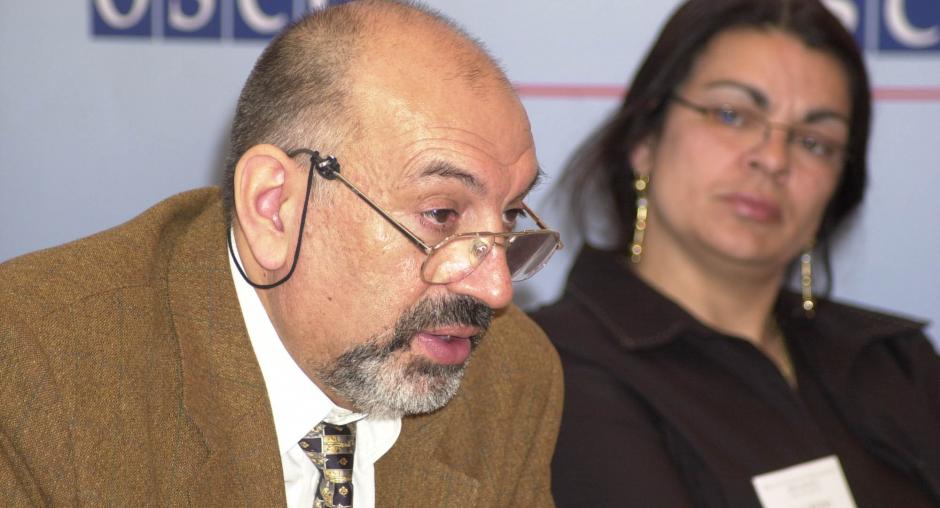Newsroom
OSCE Skopje conference ends with agreement on return of Roma refugees stranded at Greek border
SKOPJE 25 July 2003

Nicolae Gheorghe, the Head of the ODIHR's Contact Point for Roma and Sinti Issues. (OSCE/Ayhan Evrensel) Photo details
SKOPJE, 25 July 2003 - During a regional OSCE conference on the future of Roma refugees from Kosovo, which ended this afternoon, an agreement was reached on the return to Skopje of a group of some 700 refugees currently camping at the Greek border in an attempt to enter the European Union.
"This agreement really is a major breakthrough for finding a solution for the border crisis which has been in a deadlock for over two months now", said Nicolae Gheorghe, of the ODIHR's Contact Point for Roma and Sinti Issues, who brokered the agreement together with the Council of Europe and several Roma organizations. "We call on all parties involved to swiftly implement the agreement. The Contact Point will continue to facilitate dialogue between the authorities, Roma organizations and the international community."
Representatives of the refugee group and the authorities of the former Yugoslav Republic of Macedonia agreed on a five-point plan as a basis for finding a solution to the current crisis. In reaction to the closure of a refugee camp near Skopje and plans by the authorities to move the inhabitants to individual accommodation, the refugees tried to leave the country on 19 May but were stopped at the border crossing near Medzitlija, where they have been camping since.
According to the plan, the authorities, in consultation with the refugees, should immediately start identifying appropriate accomodation, and humanitarian assistance should be provided to them urgently. Also, guarantees should be given that no legal charges will be brought against the refugees who have lost their temporary residence status while being stranded at the border. It was also agreed that the refugees would be re-registered after their return to Skopje in order to legalize their status until a permanent solution can be found. This would include a possible return to Kosovo, moving to a third country, or recognition under the new asylum law adopted by the Macedonian parliament last week.
Efforts are underway to formalize the agreement reached at the conference.
The OSCE Office for Democratic Institutions and Human Rights (ODIHR) and the OSCE Spillover Monitor Mission to Skopje had organized the conference to discuss sustainable solutions for the estimated 50,000-70,000 Roma, Ashkali and Egyptians who fled Kosovo during the armed conflict in the province in 1999.
In September, a follow-up conference is planned in Pristina to examine possibilities for sustainable return of Roma refugees to Kosovo.
"This agreement really is a major breakthrough for finding a solution for the border crisis which has been in a deadlock for over two months now", said Nicolae Gheorghe, of the ODIHR's Contact Point for Roma and Sinti Issues, who brokered the agreement together with the Council of Europe and several Roma organizations. "We call on all parties involved to swiftly implement the agreement. The Contact Point will continue to facilitate dialogue between the authorities, Roma organizations and the international community."
Representatives of the refugee group and the authorities of the former Yugoslav Republic of Macedonia agreed on a five-point plan as a basis for finding a solution to the current crisis. In reaction to the closure of a refugee camp near Skopje and plans by the authorities to move the inhabitants to individual accommodation, the refugees tried to leave the country on 19 May but were stopped at the border crossing near Medzitlija, where they have been camping since.
According to the plan, the authorities, in consultation with the refugees, should immediately start identifying appropriate accomodation, and humanitarian assistance should be provided to them urgently. Also, guarantees should be given that no legal charges will be brought against the refugees who have lost their temporary residence status while being stranded at the border. It was also agreed that the refugees would be re-registered after their return to Skopje in order to legalize their status until a permanent solution can be found. This would include a possible return to Kosovo, moving to a third country, or recognition under the new asylum law adopted by the Macedonian parliament last week.
Efforts are underway to formalize the agreement reached at the conference.
The OSCE Office for Democratic Institutions and Human Rights (ODIHR) and the OSCE Spillover Monitor Mission to Skopje had organized the conference to discuss sustainable solutions for the estimated 50,000-70,000 Roma, Ashkali and Egyptians who fled Kosovo during the armed conflict in the province in 1999.
In September, a follow-up conference is planned in Pristina to examine possibilities for sustainable return of Roma refugees to Kosovo.
